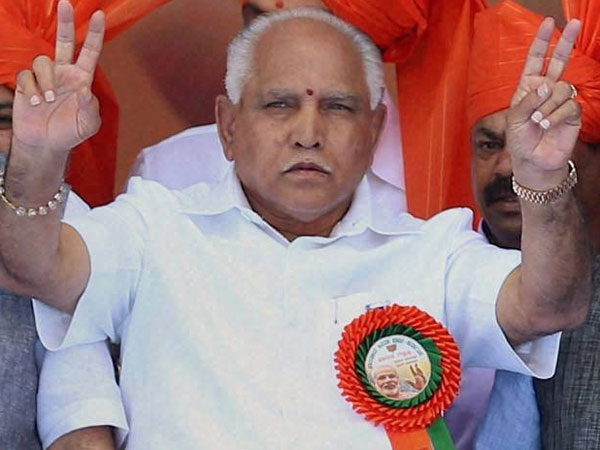BS Yeddyurappa has taken the oath as the 23rd Chief Minister of Karnataka after the Supreme Court refused to stay swearing-in ceremony. The road to Chief Ministership has not been easy for him. Late at last night, Congress and JD(S) had filed the petition against the Karnataka Governor Vajubhai Vala’s decision to invite BJP to form the government even as the BJP has emerged as the single largest party and is just seven short of the majority mark. The three-judge bench of Justice A.K. Sikri, Justice Ashok Bhushan and Justice SA Bobde has posted the matter for hearing on Friday.
Born on 27 February 1943, Bookanakere Siddalingappa Yeddyurappa’s political journey is full of ups and downs. He rose from being a clerk in a rice mill to the two term Chief Minister of Karnataka.
Yeddyurappa’s journey in public service commenced with his appointment as Secretary of the Rashtriya Swayamsevak Sangh’s Shikaripura unit in 1970. He has been closely associated with the RSS since his college days. Within two years, he was elected to the Shikaripura Town Municipality and was also anointed as the President of the Taluk unit of the Jana Sangh. He became the president of the Town Municipality of Shikaripura in 1975. He was also jailed during the emergency in 1975 and was kept in Bellary and Shimoga jails.
His journey with the BJP commenced with his appointment as the President of the Shikaripura taluk unit of the BJP. In 1983, he was, for the first time, elected to Karnataka Assembly from Shikaripura constituency which he has represented for seven times since then. In 1985, he became the president of BJP’s Shimoga district unit. He ascended very quickly within the party ranks to become the BJP’s Karnataka state president in 1988. He became the leader of opposition in Karnataka Assembly after the 1994 Karnataka assembly polls. He lost his seat in 1999 but his political prospects remained bright. BJP nominated him to the legislative council (Upper House) of the Karnataka assembly.
In 2004, Yeddyurappa was re-elected again and became the leader of opposition during the chief ministership of Dharam Singh of the Congress party. He came to power for the first time in Karnataka when he assisted the Janata Dal (Secular) leader H. D. Kumaraswamy to demolish the coalition government led by Congress’ Dharam Singh and form an alternative government with BJP. As per the terms of the accord, Kumaraswamy was to be the CM for first 20 months and BSY was to be the CM for the next 20 months. Under the Chief Ministership of Kumaraswamy, Yeddyurappa was the Deputy Chief Minister and Finance Minister of Karnataka.
In 2007, when Yeddyurappa’s turn came to become the next CM, Kumaraswamy refused to abdicate his position. This violation of terms of accord forced angry Yeddyurappa and his ministers to resign. BJP took its support back. President rule was imposed in Karnataka. President rule was revoked on 7th November 2007 when BJP and JD(S) came to the negotiation table to bury their differences and these talks paved the way for Yeddyurappa’s Chief Ministership. On 12th November 2007, Yeddyurappa was sworn in as the Chief Minister of Karnataka. However, political tussle and differences continued. Kumaraswamy was not satisfied with the allocation of ministeries to his party which finally resulted in the resignation of BS Yeddyurappa on 19th November 2007.
In 2008 Karnataka assembly elections, Yeddyurappa led BJP to a historic victory in the state. He contested from Shikaripura against former CM S Bangarappa of the Samajwadi Party and won by a margin of more than 45,000 votes despite INC and JD(S) backing Bangarappa. He was sworn in as CM of Karnataka on the 30th of May 2008.
In 2011, Yeddyurappa was forced to quit the post of Chief Minister on the charges of corruption and nepotism. After leaving the BJP, he formed his own party, Karnataka Janata Paksha (KJP) in 2012. His party performed poorly in the subsequent elections. His party won just six seats, including his. In 2014, he returned to the BJP and merged his party with the BJP. He contested from the Shimoga seat of Karnataka in 2014 Lok Sabha elections and secured victory by a huge margin of 363,305 votes.
In 2016, CBI gave him clean chit in the 40 crore illegal mining case. A special Lokayukta court then struck down four other FIRs against him. Other cases against him were also dropped. Famous as the one of the tallest Lingayat leaders in the state of Karnataka, he was made BJP’s state President for Karnataka on 8 April 2016. BS Yeddyurappa is now back again as the Chief Minister of Karnataka state that he won for the first time in 2008 for the BJP. He was the first Chief Minister from BJP to become Chief Minister of South Indian State.
